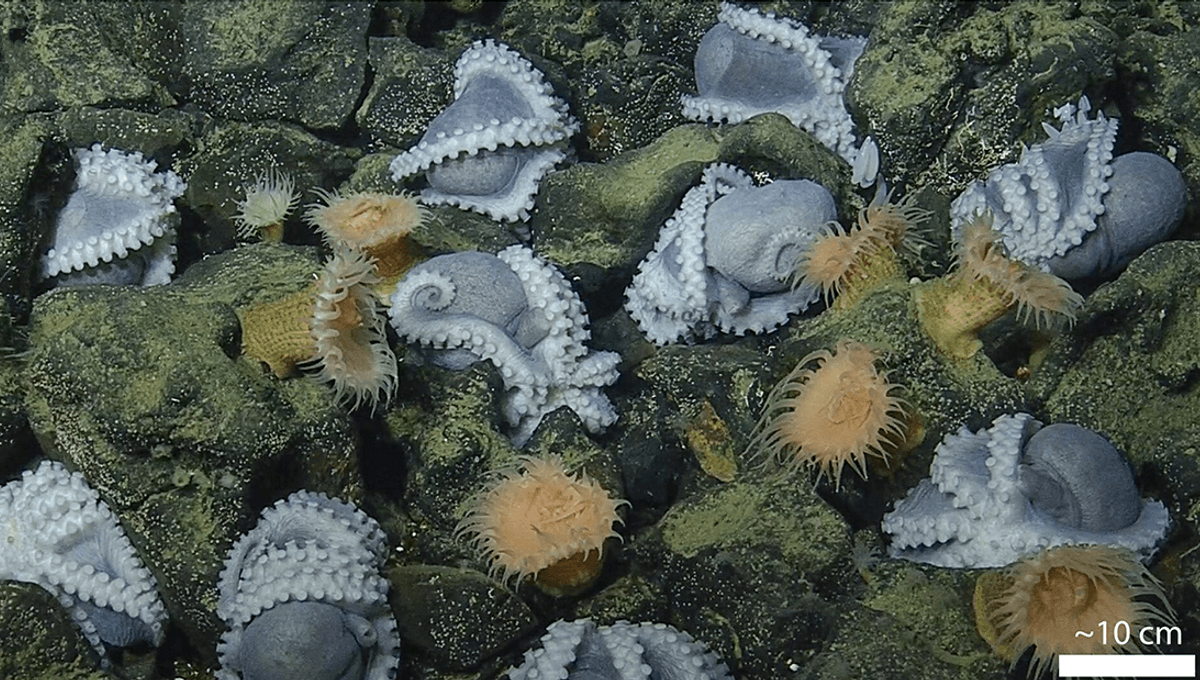
Off the coast of California over 6,000 octopuses have gathered, the largest conglomeration of deep-sea octopuses on Earth, and these cephalopods are all huddled around an inactive underwater volcano. Now scientists are just starting to understand why.
New research has shown that these areas of warm water near the springs from the hydrothermal volcanoes have many benefits to the octopus nursery. Octopuses migrate through cold, dark waters to reach these areas, where they mate and nest, and eventually die.
The site was discovered around five years ago at the base of the Davidson Seamount underwater volcano. Other similar sites have been discovered off the coast of Costa Rica where scientists witnessed eggs hatching in the Dorado Outcrop. The team think this Californian Octopus Garden area could host as many as 20,000 octopuses at one time.
“We found 6,000 animals in just a small area, and that was just a portion of where the octopuses are distributed. So we’re estimating, I don’t know, up to 20,000 animals may be there,” Jim Barry of the Monterey Bay Aquarium Research Institute (MBARI) in California, the lead researcher for this work, told NPR.
These octopuses are Muusoctopus robustus, known as pearl octopuses, and have been chronicled using the remotely operated vehicle (ROV) Doc Ricketts during 14 dives, to collect information about the octopuses themselves but also to create a map of the seafloor in that area.
“It’s definitely a special site for these animals. It’s a breeding site for this octopus. It has effects for the entire community nearby that then has spillover effects beyond that,” continued Barry.
The site is around 3,200 meters (10,500 feet) deep and surrounded by the hydrothermal springs. This means the area is much warmer than the surrounding seas. Normally the water in this area is just over 1°C (35°F) whereas the water coming out of the thermal springs is around 10°C (51°F), making it the perfect octopus spa. The team think that this gives the octopuses an advantage when breeding there, and could mean the young develop more quickly in the warmer waters.
“We never found a single nest where there were octopuses brooding in cold water,” Barry told the San Francisco Chronicle. “These animals are purposefully finding a spot in warm water.”
These octopus females will guard their eggs for up to two years, while many octopuses die after reproducing; this in turn provides food for other sea creatures in the area, such as snails and anemones.
“These are all parts of an ecosystem that’s sustained by the octopus being there and dying in there,” Janet Voight, an expert on deep-sea octopuses at the Field Museum of Natural History in Chicago, told NPR.
Moreover the team think there could be dozens more sites like this surrounding hydrothermal vents, each with their own octopus garden beneath the waves.
The study is published in Science Advances.
Source Link: Why Have 6,000 Octopuses Gathered At An Underwater Hydrothermal Spring?